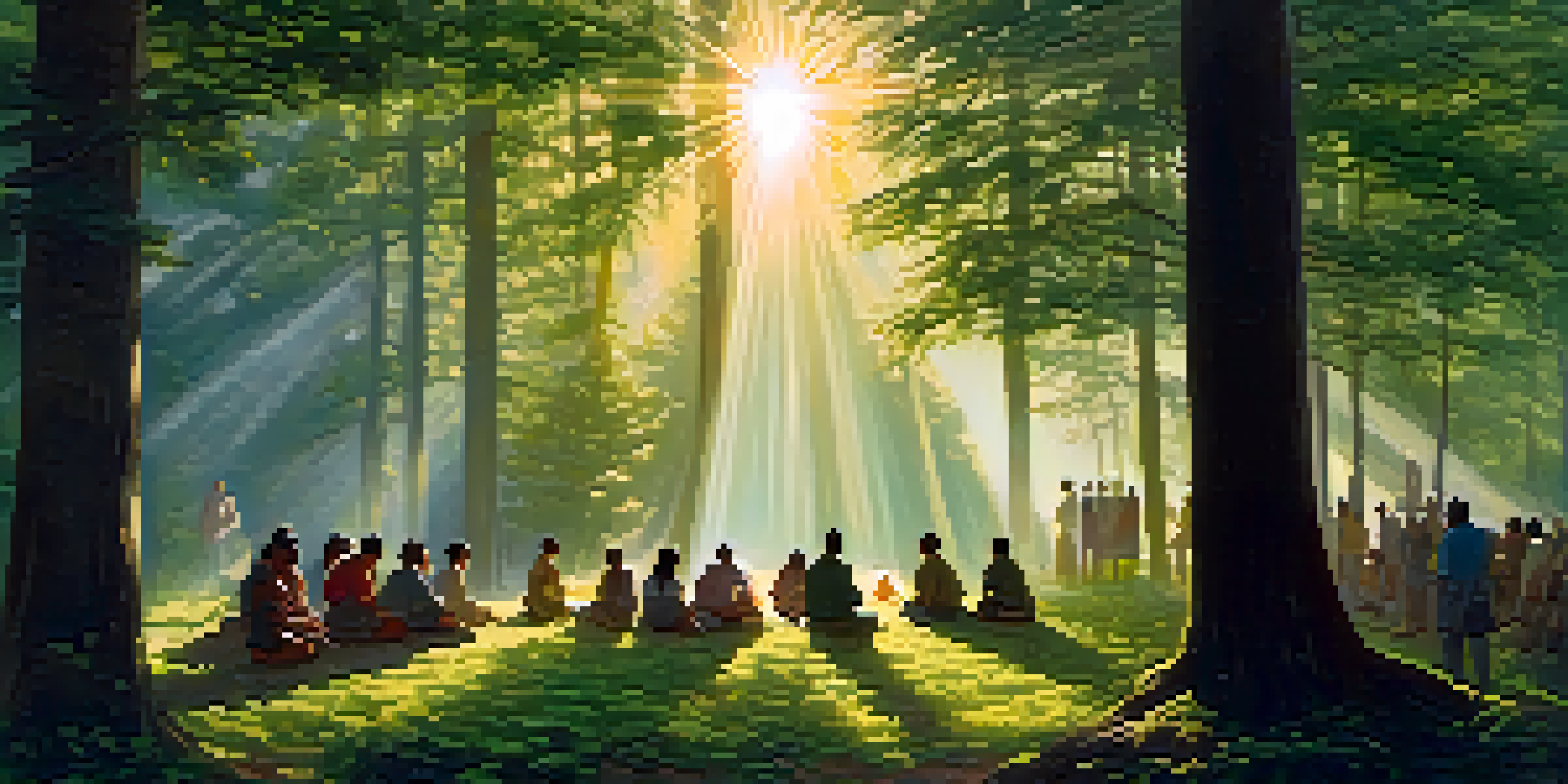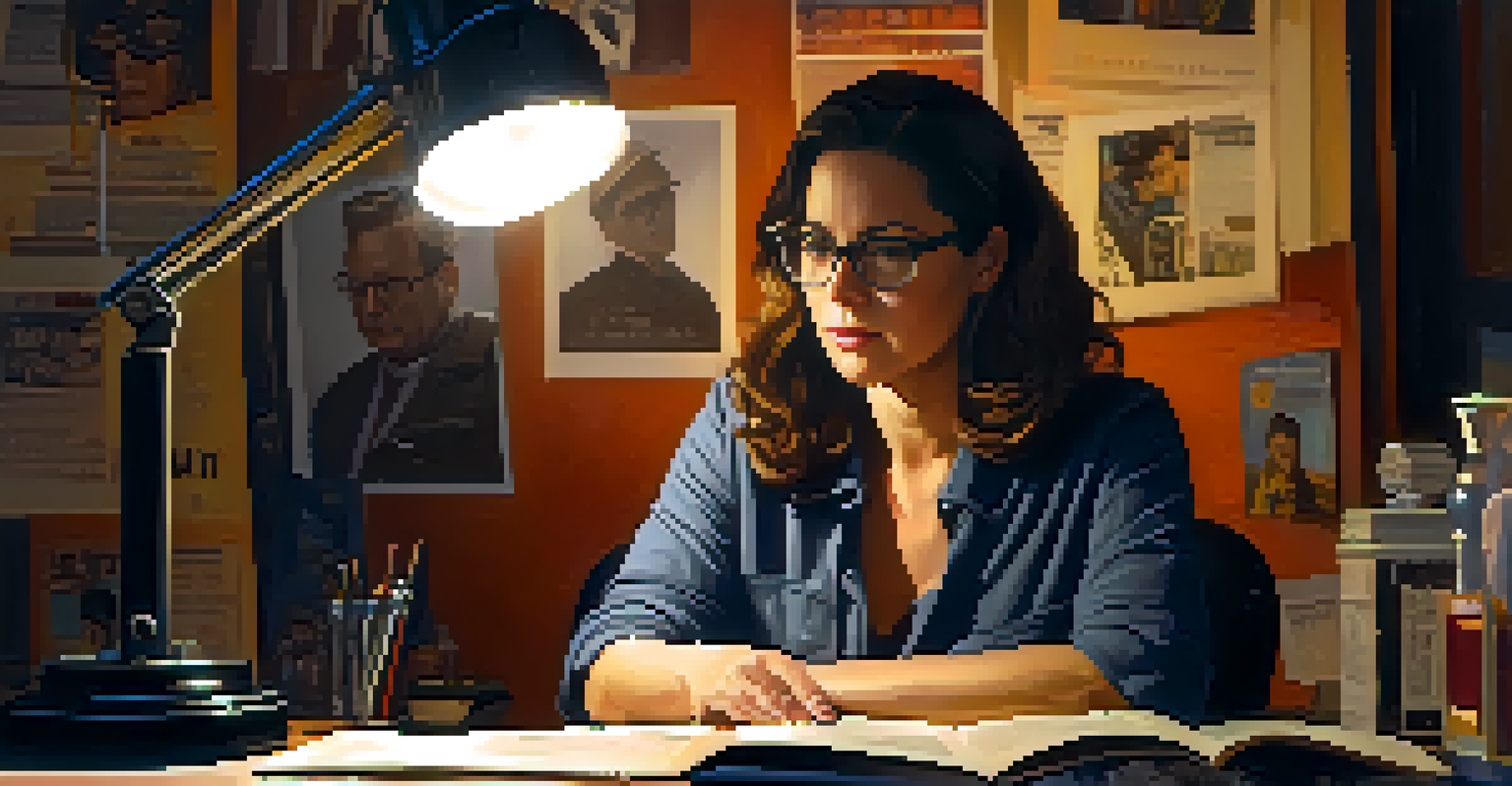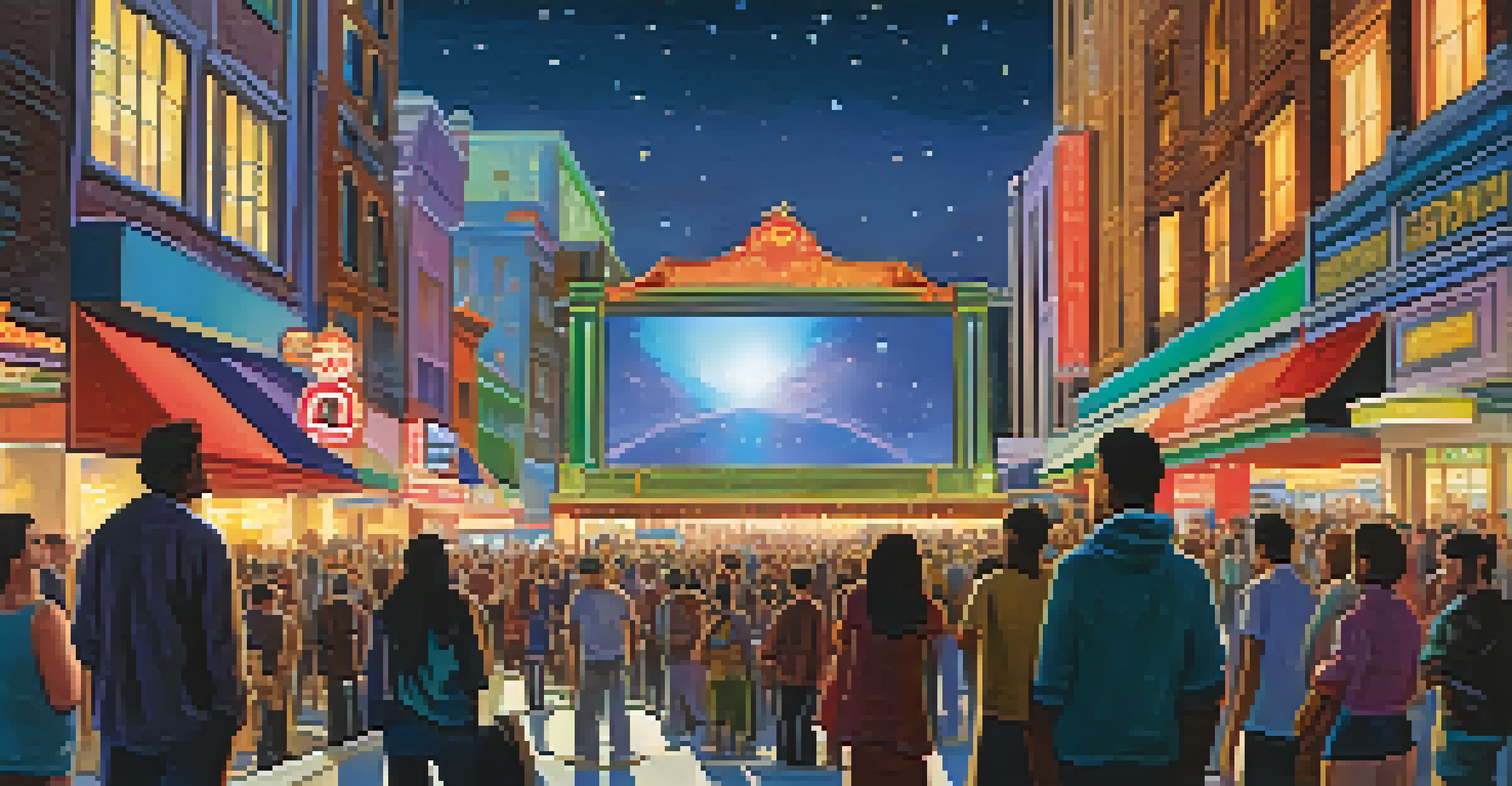The Role of Faith in Hollywood: From Blockbusters to Indies

Exploring Faith Themes in Major Hollywood Blockbusters
Hollywood blockbusters often weave themes of faith and spirituality into their narratives. Films like 'The Matrix' and 'Gladiator' showcase characters grappling with moral dilemmas and existential questions, showcasing how faith influences their journeys. These themes resonate with audiences who seek deeper meaning in the spectacle of cinema.
The function of a storyteller is to show you what you already know, but in a way that you’ve never seen it before.
Directors like Ridley Scott and the Wachowskis intentionally incorporate religious symbolism and philosophical questions, creating layers that elevate their stories. By doing so, they invite viewers to reflect on larger truths about humanity, morality, and the divine. This connection allows for a richer viewing experience that goes beyond mere entertainment.
As audiences increasingly seek films that resonate with their personal beliefs, the inclusion of faith-based narratives in blockbusters helps bridge the gap between mainstream cinema and spiritual exploration. These themes often act as a catalyst for discussions about belief, ethics, and personal growth.
Indie Films and Authentic Faith Representation
Indie films often provide a more intimate exploration of faith, offering fresh, authentic perspectives that mainstream cinema might overlook. Movies like 'Lady Bird' and 'Manchester by the Sea' delve into personal struggles with belief and doubt, showcasing how faith impacts everyday lives. This authenticity can strike a chord with viewers who see themselves reflected in these narratives.

Moreover, independent filmmakers frequently draw upon their own experiences and beliefs to craft stories that resonate on a personal level. This can lead to a more profound connection with audiences, who appreciate the raw honesty and vulnerability displayed on screen. In this way, indie films serve as a platform for voices that might otherwise go unheard.
Faith Themes in Blockbusters
Hollywood blockbusters often explore faith and spirituality, inviting audiences to reflect on deeper moral and existential questions.
As the indie film scene continues to thrive, it’s clear that faith plays a critical role in shaping narratives that challenge and inspire. These films often provoke thought and facilitate conversations about spirituality in a way that is relatable and grounded in reality.
Faith as a Catalyst for Storytelling
At its core, storytelling is about connection, and faith can serve as a powerful catalyst in this process. Whether in blockbusters or indie films, exploring faith allows filmmakers to tap into universal themes of hope, redemption, and sacrifice. This emotional depth can make stories more relatable and impactful, drawing audiences into the narrative.
Art is the most beautiful of all lies; it is the ultimate truth.
For example, films that depict characters on spiritual quests not only entertain but also inspire audiences to reflect on their own beliefs. This connection can be particularly strong in faith-based blockbusters, where the stakes are high and the emotional journeys resonate deeply with viewers. Such storytelling encourages audiences to explore the complexities of their own faith and beliefs.
In this way, faith becomes a narrative tool that transcends genres, enriching stories across the cinematic landscape. It invites viewers to embark on journeys of self-discovery alongside the characters, making the experience all the more engaging.
Diversity of Faith Representations in Cinema
As Hollywood evolves, the representation of diverse faiths is becoming increasingly prominent. Films from various cultural backgrounds illuminate how different belief systems shape individual identities and community dynamics. This diversity enriches the cinematic landscape, allowing audiences to gain insight into experiences outside their own.
From stories centered around Buddhism in 'The Darjeeling Limited' to the exploration of Islamic faith in 'The Reluctant Fundamentalist', filmmakers are embracing a broader spectrum of spirituality. This not only enriches storytelling but also fosters empathy and understanding among audiences. By showcasing these narratives, filmmakers contribute to a more inclusive representation of faith in cinema.
Indie Films Showcase Authentic Faith
Independent films provide intimate and relatable depictions of faith, reflecting personal struggles and diverse perspectives.
As viewers engage with these varied portrayals, they may find common ground in shared human experiences, regardless of differing beliefs. This highlights the power of film to unite people through stories that explore the human condition, ultimately promoting tolerance and acceptance.
The Impact of Faith-Based Films on Box Office Success
In recent years, faith-based films have garnered significant attention and impressive box office results, proving that there is a strong demand for such narratives. Movies like 'Heaven is for Real' and 'I Can Only Imagine' have not only achieved commercial success but have also sparked conversations about faith, hope, and personal struggles. This trend signals that audiences are eager for films that resonate with their values and beliefs.
Many filmmakers are recognizing the potential of faith-based narratives as a viable market segment, leading to more projects being developed with spiritual themes. This shift is not just about box office numbers; it reflects a growing acknowledgment of faith's role in shaping human experiences. By tapping into this market, filmmakers can create stories that are both profitable and meaningful.
As faith-based films continue to make their mark, they challenge the traditional notion of what constitutes a blockbuster. This evolution in the industry showcases how diverse narratives can capture the hearts of audiences, ultimately redefining success in Hollywood.
Faith and the Filmmaker's Journey
For many filmmakers, faith plays a significant role in their creative process and the stories they choose to tell. Whether it’s a guiding principle or a source of inspiration, personal beliefs often influence the themes and messages woven into their films. Directors like Darren Aronofsky and Martin Scorsese have openly discussed how their faith informs their artistic vision, leading to profound cinematic experiences.
Filmmakers often grapple with their beliefs while navigating the complexities of storytelling, resulting in narratives that explore moral ambiguities and human struggles. This inner conflict can create compelling stories that resonate with audiences, inviting them to reflect on their own beliefs and values. By grappling with these themes, filmmakers contribute to a broader dialogue about spirituality in the modern world.
Diversity Enriches Faith Narratives
The representation of various faiths in cinema fosters empathy and understanding, highlighting shared human experiences.
Ultimately, the intersection of faith and filmmaking enriches the cinematic landscape, offering audiences a chance to engage with deeper questions about existence, purpose, and morality. This journey often results in films that are not only entertaining but also thought-provoking and transformative.
The Future of Faith in Hollywood
As the film industry continues to evolve, the role of faith is likely to expand and diversify. With audiences increasingly seeking meaningful content, filmmakers will have more opportunities to explore spiritual themes across genres. This trend may lead to a greater variety of narratives that reflect the complexities and nuances of faith in contemporary society.
Moreover, the rise of streaming platforms offers filmmakers new avenues to share their stories, allowing for more experimental and diverse representations of faith. This shift provides an exciting opportunity for indie filmmakers to push boundaries and explore unconventional narratives that challenge traditional portrayals of spirituality. The future of faith in Hollywood promises to be rich and varied.

By embracing this potential, filmmakers can create narratives that not only entertain but also inspire and provoke thought. As audiences engage with these stories, they may find themselves reflecting on their own beliefs, ultimately fostering a deeper understanding of the role of faith in their lives and society as a whole.